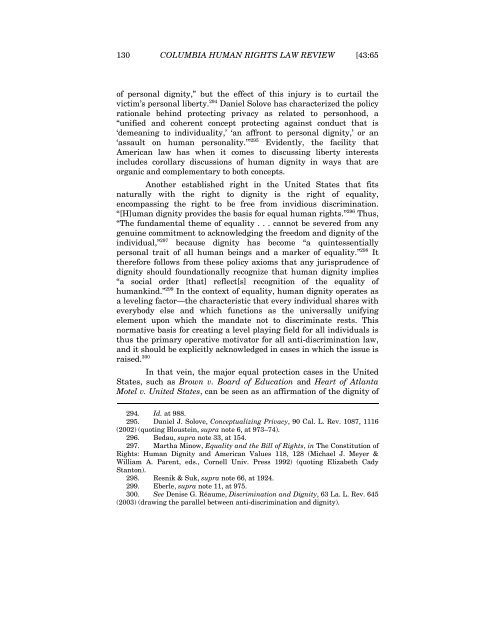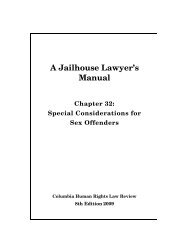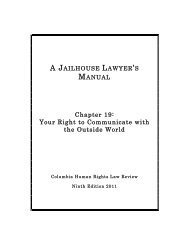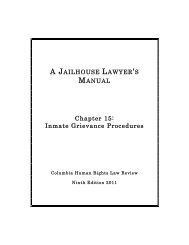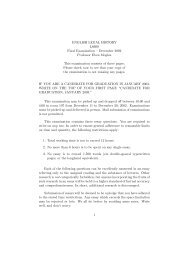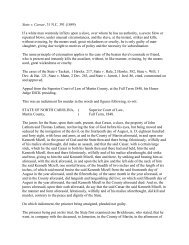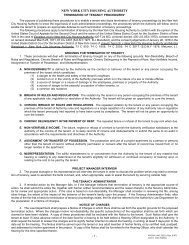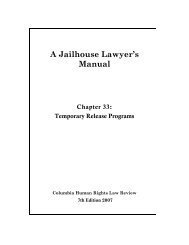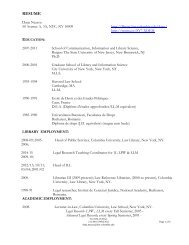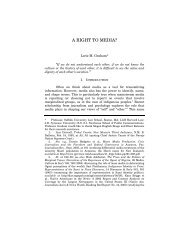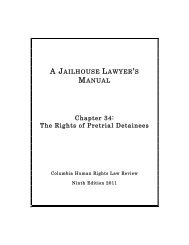The Right to Dignity Rex D. Glensy - Columbia Law School
The Right to Dignity Rex D. Glensy - Columbia Law School
The Right to Dignity Rex D. Glensy - Columbia Law School
Create successful ePaper yourself
Turn your PDF publications into a flip-book with our unique Google optimized e-Paper software.
130 COLUMBIA HUMAN RIGHTS LAW REVIEW [43:65<br />
of personal dignity,” but the effect of this injury is <strong>to</strong> curtail the<br />
victim’s personal liberty. 294 Daniel Solove has characterized the policy<br />
rationale behind protecting privacy as related <strong>to</strong> personhood, a<br />
“unified and coherent concept protecting against conduct that is<br />
‘demeaning <strong>to</strong> individuality,’ ‘an affront <strong>to</strong> personal dignity,’ or an<br />
‘assault on human personality.’” 295 Evidently, the facility that<br />
American law has when it comes <strong>to</strong> discussing liberty interests<br />
includes corollary discussions of human dignity in ways that are<br />
organic and complementary <strong>to</strong> both concepts.<br />
Another established right in the United States that fits<br />
naturally with the right <strong>to</strong> dignity is the right of equality,<br />
encompassing the right <strong>to</strong> be free from invidious discrimination.<br />
“[H]uman dignity provides the basis for equal human rights.” 296 Thus,<br />
“<strong>The</strong> fundamental theme of equality . . . cannot be severed from any<br />
genuine commitment <strong>to</strong> acknowledging the freedom and dignity of the<br />
individual,” 297 because dignity has become “a quintessentially<br />
personal trait of all human beings and a marker of equality.” 298 It<br />
therefore follows from these policy axioms that any jurisprudence of<br />
dignity should foundationally recognize that human dignity implies<br />
“a social order [that] reflect[s] recognition of the equality of<br />
humankind.” 299 In the context of equality, human dignity operates as<br />
a leveling fac<strong>to</strong>r—the characteristic that every individual shares with<br />
everybody else and which functions as the universally unifying<br />
element upon which the mandate not <strong>to</strong> discriminate rests. This<br />
normative basis for creating a level playing field for all individuals is<br />
thus the primary operative motiva<strong>to</strong>r for all antidiscrimination law,<br />
and it should be explicitly acknowledged in cases in which the issue is<br />
raised. 300 In that vein, the major equal protection cases in the United<br />
States, such as Brown v. Board of Education and Heart of Atlanta<br />
Motel v. United States, can be seen as an affirmation of the dignity of<br />
294. Id. at 988.<br />
295. Daniel J. Solove, Conceptualizing Privacy, 90 Cal. L. Rev. 1087, 1116<br />
(2002) (quoting Bloustein, supra note 6, at 973–74).<br />
296. Bedau, supra note 33, at 154.<br />
297. Martha Minow, Equality and the Bill of <strong>Right</strong>s, in <strong>The</strong> Constitution of<br />
<strong>Right</strong>s: Human <strong>Dignity</strong> and American Values 118, 128 (Michael J. Meyer &<br />
William A. Parent, eds., Cornell Univ. Press 1992) (quoting Elizabeth Cady<br />
Stan<strong>to</strong>n).<br />
298. Resnik & Suk, supra note 66, at 1924.<br />
299. Eberle, supra note 11, at 975.<br />
300. See Denise G. Réaume, Discrimination and <strong>Dignity</strong>, 63 La. L. Rev. 645<br />
(2003) (drawing the parallel between antidiscrimination and dignity).


